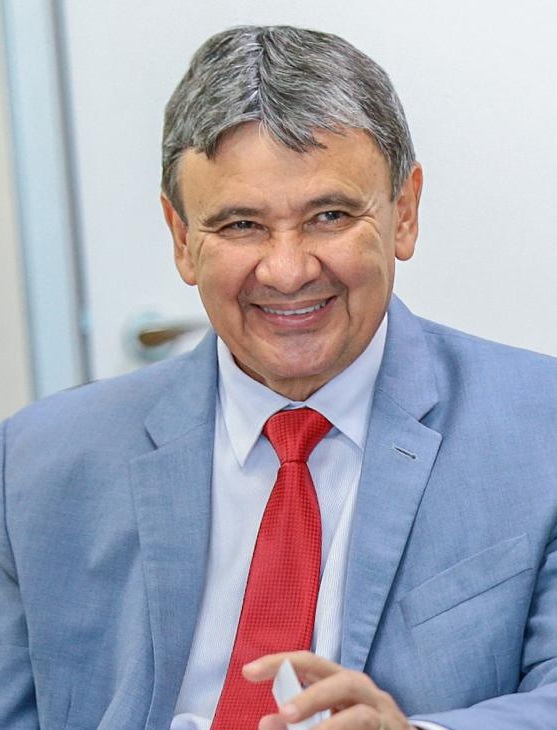
H.E. Wellington Dias
Minister for Development and Social Assistance, Family, and Fight Against Hunger, Federative Republic of BrazilIs the son of truck driver Joaquim Antônio Neto and teacher Teresinha Araújo Dias. He was born
in the city of Oeiras, Piauí, on March 5, 1962, and was raised in Paes Landim, in the Vale do
Fidalgo. He is married to Rejane Ribeiro Sousa Dias and has four children: Iasmin, Vinicius,
Daniele, and Jáiro. He studied Literature at the Federal University of Piauí (1982). He also studied
Public Policies and Government at the Federal University of Rio de Janeiro (1998) and completed
specializations abroad.
A banker and writer, Wellington worked at the Banco do Nordeste do Brasil, Banco do Estado do
Piauí, and Caixa Econômica Federal, from which he is a retired career employee. He also worked
at Rádio Difusora de Teresina. He joined the PT (Workers' Party) in 1985 and began his union
activities as a member of the Central Única dos Trabalhadores (CUT) and president of the Caixa
Econômica Federal Employees Association (Apcef) from 1986 to 1989. He served as president of
the Bank Workers' Union of Piauí from 1989 to 1992.
He also ventured into literature. He is a short story writer and author of the book Macambira,
which won an award in 1980 and was published in 1995. Several of his other short stories were
also awarded, including Maria Valei-me (1984), which received an honorable mention in the
"João Pinheiro Short Story Contest" organized by the Piauí State Department of Culture. He
wrote the plays Reisados da Minha Terra and Estamos Todos Inocentes. His works were included
in the anthologies O Conto na Literatura Piauiense (1981) and Novos Contos Piauienses (1984).
He launched the book As Tiradas de Tio Sinhô in June 2007.
Wellington Dias began his political career in 1992 as a city councilor in Teresina. In 1994, he was
elected state deputy, eventually becoming president of the PT's regional chapter, where he
served from 1995 to 1997. In 1998, he became the first PT federal deputy elected in Piauí. He
resigned from his position as federal deputy on November 29, 2002, and was elected, in the first
round, as governor of Piauí for the coalition "A Vitória que o Povo Quer," with Osmar Ribeiro de
Almeida Júnior as vice-governor.O governador Wellington Dias foi reeleito em 2006 com 61,7%
do total, obtendo 266.579 votos a mais do que na sua primeira disputa para governador, e
deixou o cargo em março de 2010 para disputar as eleições ao Senado Federal, sendo eleito
com votação histórica (997.513 votos).
Governor Wellington Dias was re-elected in 2006 with 61.7% of the total votes, receiving
266,579 more votes than in his first gubernatorial race, and left office in March 2010 to run for
the Federal Senate, where he was elected with a historic vote count (997,513 votes).
In 2014, he was once again elected governor of the state in the first round. In 2018, Wellington
Dias was re-elected for a fourth term, also in the first round. During this term, the former
governor faced a political and economic crisis, with an opposition president in power, as well as
a health crisis due to the COVID-19 pandemic. Despite these challenges, the state of Piauí
continued to improve its Human Development Index (HDI), experienced economic growth, and
ranked second in the Northeast and seventh in the country for formal job creation. Additionally,
it ranked second in Brazil for vaccination efforts.
Given the positions shared among governors regarding the unlinking of federal revenues, the
social security reform proposed by the Bolsonaro government, the federal pact in Brazil, the
hiring of doctors after Cuba's exit from the "More Doctors" Program, federal budget cuts in
education, and gun policy, the Interstate Consortium for Sustainable Development of the
Northeast (Northeast Consortium) was created. Wellington Dias played a crucial role in
institutionalizing the project, which aims to promote sustainable and integrated development in
the region, allowing for joint public procurement and the integrated implementation of public
policies, including the provision of public services such as education, communication, health,
infrastructure, and public safety.
In September 2020, Dias assumed the presidency of the Northeast Consortium and became
known for his efforts to independently procure vaccines from the Federal Government, as well as
his public policies in health, social, and economic development. In December 2021, the former
governor of Piauí received the Sérgio Arouca Health Award for his work during the pandemic,
serving as coordinator of the COVID vaccination efforts and pandemic response at the National
Governors Forum and as president of the Northeast Consortium.
In 2022, Wellington Dias was the national coordinator of the Brazilian Governors Forum. In
March, he stepped down as governor to run for the Federal Senate, to which he was elected. He
also served as the national coordinator of Lula's campaign for the presidency of the Republic.
